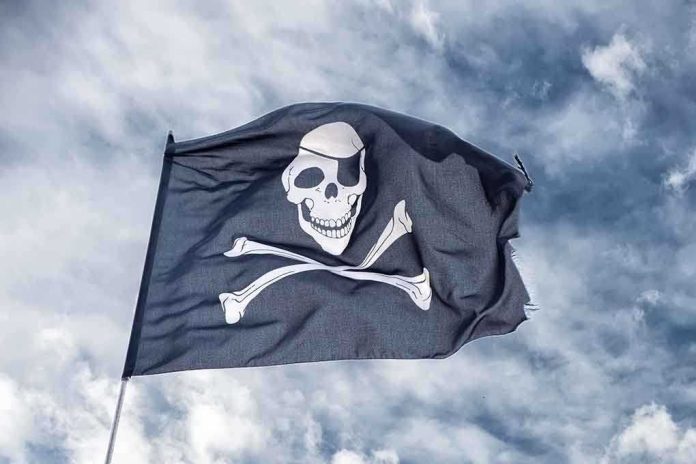
When pirates with machine guns storm a gasoline tanker over 1,000 kilometers from shore and a multinational special forces team charges in, the world learns just how quickly old threats can resurface—and how fragile global maritime security really is.
Story Snapshot
- Somali pirates hijacked the Malta-flagged Hellas Aphrodite, marking the first major commercial vessel seizure off Somalia in 18 months.
- The 24-member crew survived by locking themselves in the ship’s citadel, evading capture until international special forces arrived.
- Spanish special forces, operating under the EU’s Operation Atalanta, boarded the tanker and rescued the crew unharmed after a 30-hour standoff.
- The attack’s scale and distance from shore signal a dangerous new chapter in the resurgence of Somali piracy.
Hellas Aphrodite Hijacking: Anatomy of a High-Seas Assault
On a Thursday that will haunt shipowners for months, Somali pirates approached the Hellas Aphrodite, a Malta-flagged tanker laden with gasoline, over 1,000 kilometers from Somalia’s ragged coastline. Armed with machine guns and rocket-propelled grenades, the pirates boarded the vessel in a brazen assault that echoed the darkest days of the piracy boom a decade ago. This was not a near-shore smash-and-grab—this was a coordinated, long-range operation, the kind that keeps maritime insurers awake at night.
The 24-member crew, trained for such a scenario, executed their emergency protocol with precision: they retreated to the ship’s citadel, a fortified room designed to withstand forced entry and provide secure communication. Cut off from the pirates, the crew sent distress signals, setting in motion a multinational rescue effort. For 30 hours, the world watched as tensions mounted and the specter of violence loomed over the hostages sealed inside their steel sanctuary.
The International Response: Special Forces and Global Stakes
The EU’s Operation Atalanta, designed to keep Somali piracy at bay, scrambled naval assets. The Spanish frigate ESPS Victoria closed in, deploying special forces who boarded the tanker with the kind of speed and discipline that only years of anti-piracy operations can deliver. When they swept the vessel, they found all 24 crew members alive and unharmed, their citadel defense—and international cooperation—having averted what could have been a deadly crisis.
This intervention marked a textbook example of why naval patrols in the Indian Ocean and Gulf of Aden remain critical, even as global attention drifts to other flashpoints. The pirates, faced with overwhelming force, abandoned their prize and vanished into open water, leaving behind unanswered questions and a trail of anxiety among shipping firms worldwide.
Why Piracy Surged Back: Fragile States, Shifting Priorities
Piracy off Somalia is not a new story, but its resurgence is a warning shot. After peaking in 2011 with more than 200 attacks, international patrols and improved security measures had driven hijackings to near zero. But as Somalia’s internal turmoil festers and international naval resources are stretched thin by crises like the Houthi attacks in the Red Sea, gaps have opened for pirates to exploit. The Hellas Aphrodite attack, far from shore and executed by well-armed raiders, highlights just how quickly deterrence can erode when vigilance slips.
Local Somali fishermen, already struggling with stigma and suspicion, now face renewed scrutiny, while the shipping industry grapples with insurance spikes and rerouting headaches. For Somali pirate groups, the calculus remains simple: high risks, but potentially sky-high rewards, especially when ransom payments—like April’s $5 million for the MV Abdullah—make headlines and embolden new attacks.
Long-Term Fallout: Security, Economics, and the Human Toll
Every successful hijacking disrupts more than a single voyage. The immediate aftermath is a surge in naval patrols, insurance premiums, and anxiety among seafarers. But the broader impact stretches across continents: shipping companies may reroute vessels, driving up costs for everything from fuel to consumer goods. Somali coastal communities, many already marginalized, bear the weight of renewed suspicion and economic hardship as legitimate livelihoods are tainted by association with piracy.
For policymakers and maritime strategists, the Hellas Aphrodite hijacking is a blunt reminder: until Somalia’s governance vacuum is filled and root causes like poverty and lawlessness are addressed, piracy will remain a chronic threat. Naval coalitions can suppress attacks, but only sustained political and economic rebuilding can end them. As international navies recalibrate their focus, the world waits to see whether this incident is an outlier—or the start of another costly cycle.









